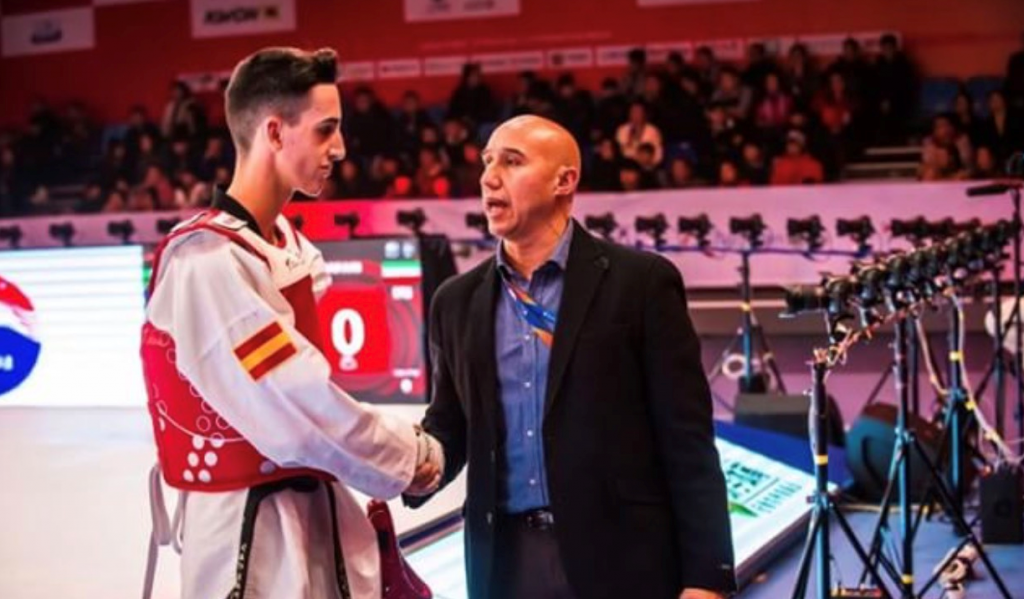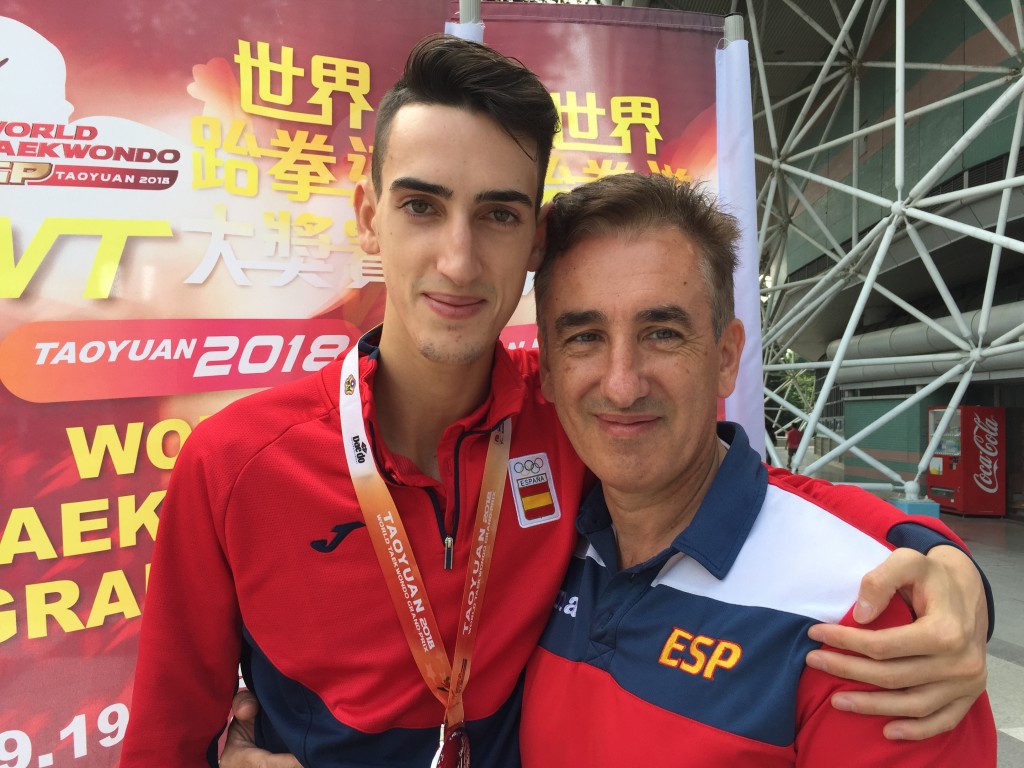|
TAOYUAN, Chinese Taipei (Sept. 20, 2018)- All coaches are proud when their players win medals, but Spain’s Jesus Tortosa was, perhaps, prouder than most on the evening of Sept. 20 at the Taoyuan Arena: His player, Jesus Tortosa Cabrera is his own son.
“Dad has been my number one fan, my number one coach – he cheers for me, he suffers with me!” said Tortosa Cabrera, after winning a tight silver in the finals of the Men’s -58kg. “For me, this is everything.”
It is indeed - for Tortosa Cabrera “learned to walk” in his father’s Madrid dojang.
Cabrera Sr was a competitor who fought at the 1988 Seoul Olympics, and the sport is a family affair: His three children are all international level players, as is his wife (albeit, as a hobbyist, not a competitor). He started preparing Tortosa Cabrera for a full-time taekwondo career after his son took a serious interest in London 2012.
Now, the future looks bright. Tortosa Cabrera is just 20, which means he is places him perfectly, age-wise, for both Tokyo 2020 and Paris 2024. And his father is far from his only influence. Currently, Tortosa Cabrera spends his days working out at the National Training Center with Spanish National Team Coach Miguel Angel Herranz. There, he has a core group of 13 persons assisting him with all aspects of tournament preparation.
The training has paid off. He has medaled in seven Grand Prix events, and proved his bona fides at the highest level on Taoyuan: His final battle was against one of the most dominant fighters in the game, Team Korea’s Tae-hun Kim.
From the opening bell, both fighters got straight down to business, unleashing middle and high kicks. Oddly, despite their high work rate, the round was low scored: 3-0 to Kim. In the second, Kim landed a close-range head kick from an impossible angle. Tortosa Cabrera responded with one of his own – but was penalized for holding. Tortosa Cabrera raised his work rate and drove Kim across the mats. Then, there was a series of dueling kicks, with both players fighting ambidextrously. Round 2 ended 7-1 to Kim. In the third, the Spaniard finally connected to the body for 3-7, then Kim lost a point for 4-7. The action continued with Tortosa Cabrera trying spin kicks, but Kim pressed his own attacks, ending the match with superb evasive footwork.
A young gun makes his mark
The end result was 10-8 and gold for the Korean kicking machine. However, it had been a remarkable performance from the young up-and-comer – just two years out of the juniors’ division - against one of the most dominant players in the game.
“This was the third time I had a fight with him, he is a really, good player – the man to beat!” said Tortosa Cabrera. “But I fought really well, and in the fight, I think he watched my face: I wanted to win. I believe in my possibilities.”
Those possibilities are significant. Talking to the young Spaniard, it is clear that he is very intelligent – a thinker as well as a fighter. He is a keen analyst of both himself and his fellow athletes. “I play in the -58kg my height is 187cm, so that is my principle strength,” he said. “When I fight, I can manage the distance and I am very well-conditioned.”
Like so many players he prioritizes the front leg, which he wields in perfect synchronicity with a thunderous punch. “My favorite kick is my punch!” he joked. His head game is equally clear. “I am an aggressive player, and that makes rivals think about it: ‘He’s coming at me all the time!’” he said. “But I am smart, I like to play with time, and with the mind of the other player. I think you can win some fights before going on to the court.”
Prior to Taoyuan, Tortosa Cabrera’s biggest win was gold at the Junior World Junior Championships in gold in Taipei in 2014. The following year, at the Manchester Grand Prix in 2015, he took silver - making his name in the senior division. “I was coming from the juniors, I was nobody in the rankings in the taekwondo world, and I achieved a silver medal, beating [Ian’s] Farzan Ashourzadeh Fallan at a moment when nobody could beat him,” he recalled. The next year, it was bronze at the 2017 World Championships in Muju. “I was in really good shape and fought very well in the first four fights,” he said. “I lost in the semi final, but I was in my best shape of all time.”
His father is upbeat on his potential. “He has won seven Grand Prix medals and he is only 20!” Tortosa enthused.
Tortosa Cabrera loves not just the play, but also the players. “I am friends with the people I fight with: Inside the court is one thing, outside the court is another thing,” he said. “We are all sports people, we train, we sacrifice a lot, we all talk about how difficult it is to make weight. We are humans. If you are angry with the people you fight with in your career, you will be alone. “
On track for Tokyo
And as he loves the game, he has strong opinions about how to transition taekwondo from a participant sport to a spectator sport. The first thing has to be transparent regulation.
“The people who understand the sport are the people who do the sport, that is the principle problem,” he said. “I go to events with friends and they say, ‘Why aren’t you winning if you are kicking more times’ – normal people don’t understand the rules, when people can lose by gamjeon.” Another negative is the length of many competitions. “At National Champions and Opens start at 8:00 am and end at 11:00 pm,” he noted. “It is not possible for normal people to watch that!”
He offered a novel suggestion to raise the sport’s profile. “One thing that would make this sport go up is betting: All sports are bet on,” he said. “This would make not only [participants] like the sport, but people who want to make money would also watch it.”
Tortosa Cabrera is currently pursuing a sports science degree in Madrid; his financial needs as a competitor are met by government sponsorships. Naturally, his eyes are set on Tokyo 2020 – and despite his youth, he is already familiar with the agony and ecstasy of the world’s greatest sporting event.
“My best moment in the game, I think, was in 2016 when I qualified for the Olympics at the European Qualifications, and my worst moment was in Rio,” he said. “I had a medal in my hands – I was so close! – and I lost in golden point in the bronze medal fight. You have the glory right there – then, in 20 seconds you have nothing! The difference between having an Olympic medal and not having one is everything.”
In the run-up, he is gunning for gold at the Worlds in Manchester next year and then hopes to “get the medal I didn’t get in Rio” in Tokyo.
The path to 2020 is one he will not be walking alone. Firstly, he has the full support of the National Training Center. Secondly, his girlfriend of over a year is fellow competitor Irene Laguna of Team Spain. Thirdly, of course, he has the strongest family support any player could realistically ask for - the father-son/coach-player relationship.
“We make a very good team,” said the father. “He is very disciplined, very smart and he follows my opinions.”
“All my results are thanks to him,” said the son. “This is something that people who don’t have it will never know.”
Jesus Tortosa Cabrera at a Glance
Hobby: “I play guitar. I play rock when I am alone; when I am with friends, I play more popular songs that everyone knows.”
Favorite song: “Thunderstruck” by ACDC
Favorite movie: “Django”
Favorite food: Paella
Why taekwondo? “I love all the things this sport gives me. The adrenalin of being in a court fighting against another person and knowing that all your work comes down to six minutes is something you can never have anywhere else. And thanks to the sport, I have visited many countries and met people from many cultures.”
Motto: “Without sacrifice there is no gain.” |



